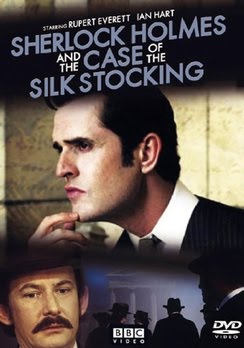
SHERLOCK HOLMES AND THE CASE OF THE SILK STOCKING
UK, 2004, 99 minutes, Colour.
Rupert Everett, Ian Hart, Neil Dudgeon, Michael Fassbender, Tamsin Egerton, Perdita Weeks, Eleanor David, Jonathan Hyde, Helen Mc Crory, Rachel Hurd-Wood?.
Directed by Simon Cellan Jones.
Sherlock Holmes and the Case of the Silk Stocking is a rather lavish BBC production, in the vein of the very popular series which starred Jeremy Brett as Sherlock Holmes.
Writer Allan Cubitt (adaptation of The Boys are Back, based on his own experience, as well as films like the Richard Roxburgh Hound of the Baskervilles) wrote an original story, harking back to Conan Doyle and his era, yet giving it something of a contemporary tone. The period is 1902, with rather lavish sets, costumes and décor, indicating the life of the aristocracy as well as royalty, with Edward VII. There are also the poor parts of London, especially in the East End and Whitechapel, with its echoes of Jack the Ripper.
Sherlock Holmes is played by Rupert Everett, fitting his particular style to that of Holmes, a touch indolent, a touch aristocratic, indulging in opium at times, seemingly bored, getting interested in an investigation, offhand at times in his dealing with Doctor Watson, yet appreciating his fiancée and her psychoanalytic skilles. He also seems more fallible, in not working out with such elementary fashion, the identity of the killer. Ian Hart is very good, a more serious and sensible Doctor Watson. As in the Robert Downey Sherlock Holmes, Watson is engaged – but here, Holmes is much more attentive to Doctor Watson’s fiancée.
The film has a very good supporting cast, especially Neil Dudgeon as Inspector Lestrade, slow on the pickup at times, but not ridiculed as in other stories. Jonathan Hyde makes a very aristocratic George Pentney, with Eleanor David as his ambiguous wife.
The film was directed by Simon Cellan Jones, rather prolific in material for television.
Many of the purists did not like the film, said that it did not capture the atmosphere of Conan Doyle’s world, that Rupert Everett was an unlikely Holmes, that the screenplay was not well thought out or written…
However, those who are not Conan Doyle purists, may well enjoy the murder mystery (although identical twins seem something of a copout) and enjoy Everett and Hart in their investigations. The atmosphere of the times – with 21st century perspectives and language – should entertain audiences who enjoy this kind of detective story.
1. The continued popularity of Sherlock Holmes, in the books, on film? Writers inventing Holmes stories?
2. Rupert Everett and Ian Hart, working together as Holmes and Watson, similarities to Conan Doyle’s creation, differences in interpretation?
3. The 1902 setting, the Edwardian period, post-Victorian? The touches of the fin de siecle and Aubrey Beardsley atmosphere? Rupert Everett a touch like Oscar Wilde? London, Whitechapel, Belgravia, the aristocracy, royalty? Baker Street? Holmes, opium dens? The atmosphere, costumes and décor? The atmosphere score?
4. The introduction to Holmes, the opium den, his being bored, Watson visiting him, taunting him, the cup of tea and Holmes speaking in Chinese, brushing Watson off? Watson giving the bait, Holmes taking it, going to the morgue, the dead body, the autopsy, the medical examiner? Holmes and his observation about the clothes, the knot? The murder, the stocking around the neck, in the mouth? Identifying the corpse? Going to the parents, their reactions, Mary Pentney and her rehearsal for the dancing, her daughter’s absence, the clash? George Pentney and his confrontation with Holmes, hiring him?
5. The second murder, finding the body hanging, the girl’s parents, sister, their grief? Further information about the method of the killer, the stockings, sexual sadism?
6. The investigation about the previous murder, the identity of the maid from America, her work in service, the footman? The body found, the stocking? Mr Bilney and his shoes, his information about the girl? Giving her a job after she was dismissed? Her death?
7. Holmes and his investigation, his style, his saying ‘elementary’? His deductions? His treatment of Watson, relying on him, yet concealing things from him? The interrogation of Imogen, his relying on Jenny, his respect for her? With Inspector Lestrade, taking him step by step, friendly, but Lestrade’s limitations? His suggestion for the set-up, asking Roberta’s permission? At the dance, his disguise as the Belgian, his comments about the best detective in Europe? Watson’s response? His failure, the issue of the fingerprints, the realisation that there were identical twins, their interchanging their presence? His trying to work things out – his fallibility?
8. Doctor Watson as sensible, friendly, his concern about Holmes’s health, drinking, drugs? His fiancée, the meal, Holmes and his attitude towards Jenny? Jenny, her background, forthright? Questioning Imogen and getting the information? Watson and his interviewing Bilney? Pretending to be an American? His work as a doctor with the victims?
9. Charles Allen, job as a footman, the relationship with Mary Pentney, Watson observing their intimacy? His alibi? The difficulties with the prince? His brother? The arrest, the interrogation, the fingerprints, the wrong brother? The escape from jail and pursuit? The murderer, at the function, the champagne for Roberta, abducting her, carrying her out of the house, the assault, her being rescued?
10. Imogen and the funeral, her being abducted, the attack, her escape? Holmes walking her past the footman and her terror, identifying him?
11. Inspector Lestrade, a decent policeman, plodding, his men? Murder sites and their investigations, like buffalo, according to Holmes?
12. The finale, the grateful father? The truth about the Pentneys and their relationship? The wedding, the photos, the three in the photos? Holmes’s future?